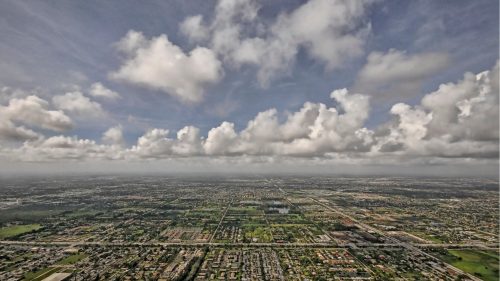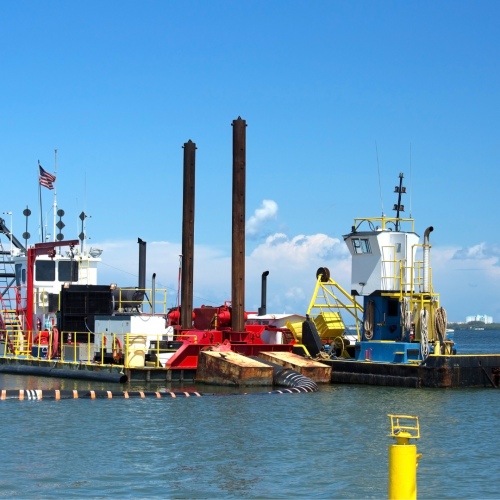More than 1,000 people move to Florida every single day. As people pour into the state, policymakers must plan how to balance this growth with the health of the state’s natural resources and landscapes.
For this session, several bills are on the table regarding funding for conservation projects, permitting rules, and changes to the Community Planning Act.
Here’s what it’s all about:
- Funding for Environmental Resource Management
- Office of the Blue Economy
- Land Use and Development Regulations
- Dredging and Beach Restoration Projects
- Land Acquisition Trust Fund
- Other related bills
Funding for Environmental Resource Management
In 2021, Florida Gov. Ron DeSantis signed a historic gaming compact with the Seminole Tribe of Florida. The deal gave the Tribe exclusive rights to sports betting in Florida, using a “hub and spoke” model. In this model, bets placed anywhere in the state using a mobile app or electronic device would be run through servers on Tribal lands and considered conducted by the Tribe. In exchange, the Tribe agreed to pay the state of Florida $2.5 billion of its revenue over the first five years. The deal was challenged by the U.S. Supreme Court in 2023 but remains in effect.
SB 1638, introduced by Florida State Sen. Travis Hutson (R), would require 96% of those funds to be directed toward environmental resources and protection. The senate approved the bill on February 22, 2024.
The bill calls for the funds to be allocated in the following ways:
- 32% would be dedicated to land acquisitions, with priority placed on lands inside the Florida Wildlife Corridor.
- 32% would go to current management of lands and the removal of invasive species.
- 32% would go towards water quality and be distributed to the Water Protection and Sustainability Program Trust Fund within the Department of Environmental Protection (DEP). The funding distributed to the Water Protection and Sustainability Program Trust Fund would partially be used to create the Water Quality Work Program within the DEP.
HB 1417, introduced by the Appropriations Committee and Infrastructure Strategies Committee and Florida State Rep. James Buchanan (R), would take similar measures to allocate funds to environmental resource management.
UPDATE: HB 1417 was laid on the table, meaning it was set aside and died at the end of the session. SB 1638 passed and was ordered enrolled, meaning it was approved by both the House and the Senate and sent to Governor DeSantis for approval.
Office of the Blue Economy
Florida is the only state in the continental U.S. largely surrounded by coastal seas and oceans. Our state’s booming tourism and fishing industries are intrinsically linked to the health of our coasts.
If passed, HB 1311— introduced by Florida State Reps. Kelly Skidmore (D) and Chip LaMarca (R), and the Florida House Regulatory Reform & Economic Development Subcommittee — would establish the Office of the Blue Economy within the state’s Department of Economic Opportunity. SB 1754, a similar bill introduced by Florida State Sen. Jason Pizzo (D), would do the same.
The bill defines the blue economy as the economic uses of ocean and coastal resources, which include boating, fishing, seafood farming and processing, diving, tourism, recreation, or any other industry that relies on ocean and coastal resources. In addition to establishing an Office of the Blue Economy, this bill would also require the office to regularly publish Florida public university-backed research related to the ocean and coasts that could be used by ocean-related businesses to make informed decisions.
Similar legislation died in the 2022 and 2023 sessions. Two years ago, before the bill died in the 2022 legislative session, Skidmore told Florida Politics that the office “would look out for the economic health of the water, would care about its environmental health, and work with those agencies to make sure that we’re doing all the right things.”
UPDATE: HB 1311 died in the Education and Employment Committee.
Land Use and Development Regulations
A municipality’s comprehensive plan is a process that determines community goals and aspirations in terms of community development.
HB 1221, introduced by Florida State Rep. Stan McClain (R), relates to comprehensive plans and future use plans in Florida. A related bill, SB 1184, was introduced by Florida State Sen. Blaise Ingoglia (R). These bills are complex and relate to the Community Planning Act.

The Community Planning Act, which was enacted last year, provides counties and municipalities with the power to plan for future development by adopting comprehensive plans consistent with the public interest. This act tasks local governments with protecting, preserving, and maintaining public health, safety, and comfort of residents and the natural environment and encourages collaboration between neighboring counties and municipalities. Each county and municipality must maintain a comprehensive plan to guide future development. These plans may include ordinances and requirements that guide development decisions for the next 10 to 20 years.
The bills, if passed, would do the following:
- Both bills would allow for expansion of self-storage facilities. “For purposes of any minimum distance requirements imposed by local ordinances or regulations, the expansion of a self-storage facility that is adjacent to and abutting an existing self-storage facility, and that is owned and managed by the same person or entity, may not be considered or deemed a new self-storage facility,” reads the bill text.
- HB 1221 would define “infill residential development” as the “expansion of an existing residential development on a contiguous vacant parcel of no more than 20 acres in size within a residential future land use category and a residential zoning district that is contiguous on the majority of all sides by residential development. The term ‘contiguous’ means touching, bordering, or adjoining along a boundary. Properties that would be contiguous if not separated by a roadway, railroad, canal, or other public easement are considered contiguous.”
- Both bills would require that applications for infill residential development be administratively approved, regardless of what a municipality’s comprehensive plan states. New houses could be more easily constructed in underused or underdeveloped lots in urban areas.
- HB 1221 also looks to change the definitions of density, intensity, and urban sprawl to be less specific, which some opponents say can remove existing guardrails on certain types of development in Florida. A similar bill from last year’s legislative session that attempted to change the definition of urban sprawl died. Its companion bill did not include the proposed definition changes and passed in the 2023 legislative session.
- Both bills would remove the requirement that community goals and vision be considered in developing comprehensive plans.
- Certain types of demographic, economic, and environmental data are needed to develop comprehensive plans. Both bills would alter the guidelines regarding the types of data that can be used and limit local government involvement in how that data is collected, evaluated, and used.
- Both bills would also allow a final order or decision regarding historically significant property made by a local historic preservation board or commission to be appealed to the applicable board of county commissioners.
Advocacy group 1000 Friends of Florida opposes both bills, stating the legislation makes “significant changes to definitions within the Community Planning Act, including the type of data that can be used for comprehensive plan amendments, including population projections and prohibit local governments from limiting density and intensity within optional elements of their plans. The changes would eliminate helpful indicators that communities use to identify urban sprawl, and remove community visioning from the requirements for consideration in comprehensive plans.”
UPDATE: SB 1184 died in the Community Affairs Committee; HB 1221 died on the Second Reading Calendar.
Dredging and Beach Restoration Projects

Dredging is defined by the Florida Department of Environmental Protection as “excavation in wetlands or other surface waters or excavation in uplands that creates wetlands or other surface waters.”
To protect Florida’s surface waters and wetlands from possible degradation from construction activities, dredging has been regulated in Florida since the 1970s. Currently, a permit is needed for any dredging or beach restoration project. To obtain a permit, an environmental impact analysis is required.
Identical bills SB 608 and HB 163 — introduced respectively by Florida State Sen. Ana Maria Rodriguez (R) and Florida State Reps. Vicki Lopez (R) and Peggy Gossett-Seidman (R) — would change the permit requirements for dredging and beach restoration projects.
If passed, this legislation would require that any analysis to determine the adverse impacts of the activity on the natural habitat be conducted by an independent contractor selected by the local government and in a manner prescribed by the Florida Department of Environmental Protection.
According to the bill text, “the independent contractor conducting the analysis may not be associated with any project of the contractor performing the activity for the local government for a period of 1 year before the commencement of the analysis or for a period of 1 year after the completion of the analysis.”
The bill does not apply to any deepwater port maintenance dredging currently permitted or maintained by the U.S. Army Corps of Engineers.
If the law goes into effect, violators will be charged a fine of 10% of the total project cost or an amount determined by the department or the United States Army Corps of Engineers, whichever is greater.
UPDATE: SB 608 died in the Environment and Natural Resources Committee; HB 163 died after the First House Reading.
Land Acquisition Trust Fund
The Florida Land Acquisition Trust Fund was established in 1964 to allocate money to buy public land and set it aside for recreation and conservation. There are several bills in this session that address the Land Acquisition Trust Fund and the programs that stem from it.
SB 452, introduced by Florida State Sen. Colleen Burton (R), and HB 451, introduced by Florida State Rep. Melony Bell (R), would require a $20 million annual appropriation from the Land Acquisition Trust Fund to the Florida Department of Environmental Protection (DEP) to implement the 2017 Heartland Headwaters Protection and Sustainability Act. This act formally acknowledged the significance of aquifers in Polk and Lake counties as important headwaters for some of Florida’s major rivers. The bills call for the funding of water supply projects in central Florida.
In 2022, a similar bill was introduced as SB 1400, but the vague language of the bill made it a target of environmental groups. Another similar bill was also introduced last year, SB 608, but died in the Appropriations Committee on Agriculture, Environment, and General Government. The Heartland Headwaters Protection and Sustainability Act states that “priority funding consideration must be given to solutions to manage the water resources of these headwaters and the local Floridan Aquifer system in the most efficient, cost-effective, and environmentally beneficial way.”
UPDATE: SB 452 died in the Appropriations Committee on Agriculture, Environment, and General Government; HB 451 died in the Agriculture & Natural Resources Appropriations Subcommittee.
Other related bills
- Environmental Management – SB 738 and HB 789 (SB 738 died in Messages; HB 789 died on the Second Reading Calendar)
- Statewide Environmental Resource Permitting Rules – SB 406 (died in the Fiscal Policy Committee)
- Land and Water Management – SB 664 and HB 527 (SB 664 died in the Environment and Natural Resources Committee; HB 527 died in the Water Quality, Supply & Treatment Subcommittee)